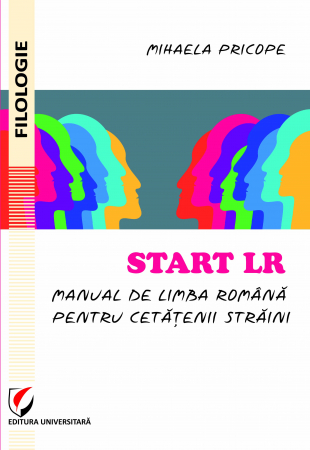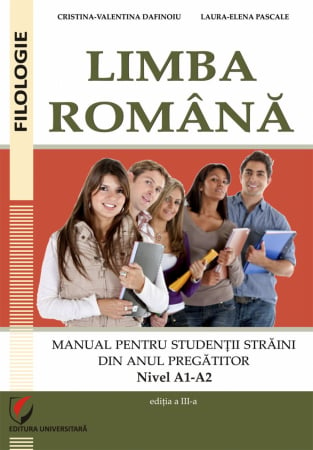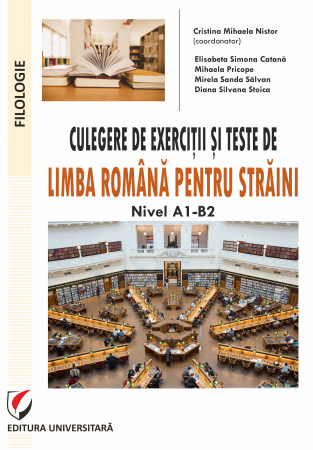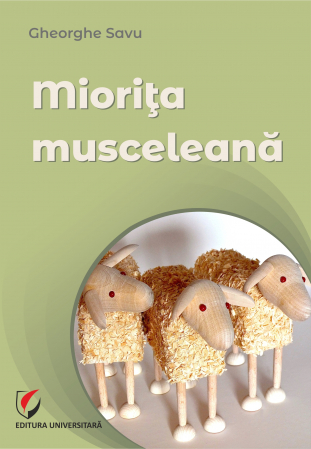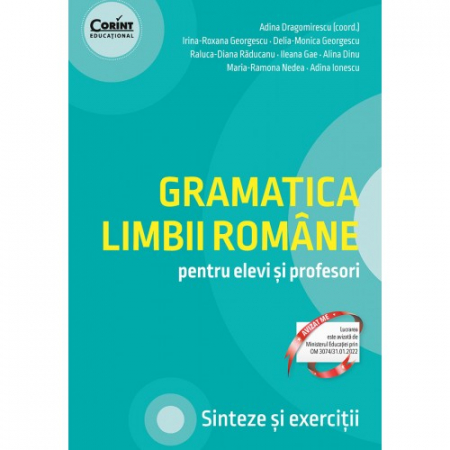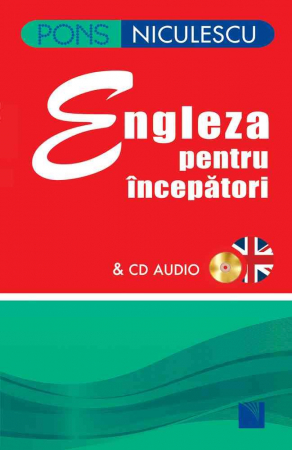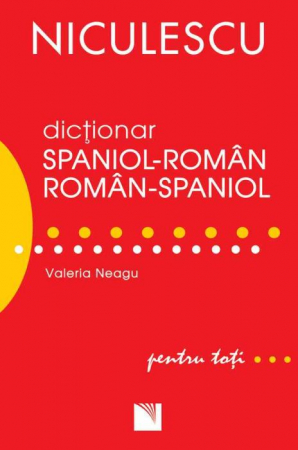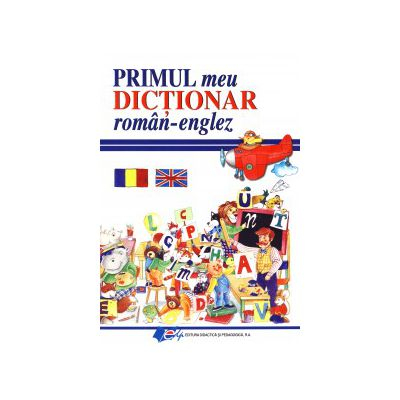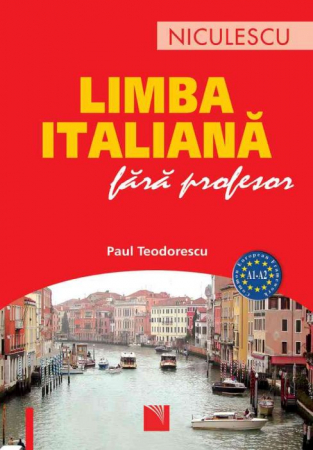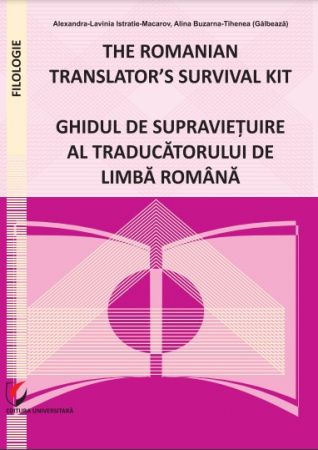6359.png) The language of science. Language sciences - Alina Buzatu, Cristina Valentina Dafinoiu, Lacramioara Berechet
The language of science. Language sciences - Alina Buzatu, Cristina Valentina Dafinoiu, Lacramioara Berechet
6359.png)
ISBN: 978-606-28-0869-3
DOI: 10.5682/9786062808693
Publisher year: 2019
Pages: 270
Publisher: Editura Universitară
Author: Cristina Valentina Dafinoiu, Alina Buzatu, Lacramioara Berechet
- Description
- Download (1)
- Authors
- More details
- Content
- Reviews (0)
-
The Language of Science. Language Sciences
Download
LACRAMIOARA BERECHET
ALINA BUZATU
CRISTINA VALENTINA DAFINOIU
The collective volume The language of sciences and language sciences proposes a thematic repertoire associated with a problem still open in the field of current research, namely the relationship between language, literature, sciences. Most of the studies filed between the covers of the volume express the scientific research of the university staff of the Department of Romanian Philology, classical and Balkan languages within the Faculty of Letters of the "Ovidius" University of Constanta, being the scientific result of the two centers research of the department: Metacognition and transdisciplinarity (M&T) and Romanian Studies in International Context (STUR) as well as of some collaborations with prestigious universities in the country.
The lines of scientific interrogation map a space of wide interest, starting from the observation of neopositivists (KR Popper, 1934) according to which any sentence is influenced by the theories of a historical epoch that builds its language according to the accumulated experiences, to the interest on language starting from thinking. mathematics (G. Frege, 1893; B. Russel, 1948) or from the algorithms of logic (CS Peirce, 1966) or from the operators of strong sciences (R. Carnap, 1950; L. Wittgenstein, 1955), therefore from the systematics of formal languages , denotative, coded, located outside any creative expressiveness providing semantic ambiguity, until the communication within the literary text, in which the information introduced are subjective, polysematic, ambiguous, extracted from the individual or collective unconscious, obscure or hermetic, but modeling secondary the real (IM Lotman) and at the same time conventionally rewriting the individual unconscious or cole ctiv (J. Lacan, 1966), until the interpretation of language in the order of institutive hermeneutics, the method of revealing an ineffable or mystical ontological dimension (P. Ricoeur, 1974; H. G. Gadammer, 1960; M Eliade, 1975).
The language of science, as a logical, ideal, operational language, able to transmit without rest the results of scientifically observable experiences is also distinguished as a field of interest in the collective volume The language of sciences and languages sciences. On the other hand, the relativization of language through the variable equation sense-reference, meaning-denotation, the transfer of the object and the research method in the framework of transdisciplinarity, positioning language as a condition of possibility, a dialogue between disciplines and in an infraspace, engaging the premises a unifying utterance, but a disciplined vigilance, as well as an adjustment of the metaphysical language through the discipline of linguistic philosophy, all these interdisciplinary situations open problems, propose solutions, anchor interrogation perspectives.
The cognitive perspective transferred from the reference area of psychology in terms of semantics, in the reference area of pragmatics and didactics, but also of the reception of any type of discourse opens reflection contexts in the studies present in the volume. The volume proposes scenarios of theoretical and critical interrogation in the order of disciplines integrated cognitivism and the need to form a disciplined, creative mind, accustomed to innovate, to interrogate the literary text in its indescribable structures of depth, to reform narrative scenarios, to rewrite symbolically, to prove the prototypicality and atypicality of representation regimes (Alina Buzatu, Lacramioara Berechet, Achim Filiz). The role of translations in the formation of theatrical language and metalanguage in the nineteenth century (Marina Cap-Bun), the integrative dialogue between mathematical, metaphysical, liturgical language and philosophical language to imagine and explain the sacred space (Adriana Cateia, Vasile Cacioianu), literature as an organizing discourse of all languages (Daniela Craciun), the history of language from the perspective of the concept of “transdisciplinarity” (Cosmin Caprioara) describes the space of scientific interest of the volume.
At the same time, this first volume, hoping from a wider series, opens the exploration of the literary text and in the order of the history of mentalities and ideas, through subtle and nuanced reflections on the language of failure and
The "science" of failure, modeled by the codes of Byzantine culture and civilization in Romanian literature (Angelo Mitchievici), the decoding of the dream language through the cogital schemes of aquatic poetics (Madalina Stoica) of digital communication infrastructures (Florentina Rusu).
The way in which the language of literature, thanks to a transdisciplinary didactic approach, associated with the hermeneutic dialogue in Gadamerian sense, can build an integrative identity (Nicoleta Terteleac), the capture of some didactic perspective scenarios, referring to the decoding of metaphorical expressions lines of scientific interrogative interest.
The study of language proposes in volume the issue of language sciences, cutting nuanced, theoretical and applied, with integrative investigation methods, topics such as intrapropositional junction (Mihaela Miron), approaches to Latin temporal circumstances (Florentina Nicolae), the issue of teaching English in Romania (Costin -Valentin Oancea), but also Romanian as a foreign language. A series of proposals of wide interest for the mentioned field can be found in the frames of the volume: the role of the input in the acquisition of the second language (L2) and its preparation for the exercises of receiving audio and written texts in Romanian as a foreign language (Elena Platon). in the doctor-patient communication relationship (Silvia Nastasiu, Ludmila Braniste), spatial and temporal structures in Romanian as a foreign language and the processes of linguistic adaptation to cultural communication structures (Veronica Nedelcu, Laura Pascale), teaching specialized languages and their role in the process of acquisition of the Romanian language by foreign students in the preparatory year (Cristina-Valentina Dafinoiu), learning through cooperation and teaching methods in Romanian as a foreign language (Cristina Ilea Rogojina).
The current perspectives of didactic research are represented in volume by scientific studies, on the role of academic and social learning in the development of students' professional skills (Rodica Gabriela Enache) and creative approach to the educational curriculum through didactic transposition (Virgil Frunza).
We thank the editors of this volume (Alina Buzatu and Cristina Dafinoiu) as well as all collaborators, also expressing our hope to deepen these lines of research opened by the authors, possibly in a series of volumes whose theoretical and applied contributions to answer the topic on which the volume this is proposed by: the sciences of languages and the language of sciences.
Lacramioara Berechet
A. Literary text and interpretive sciences. Didactics of disciplines / 11
BERECHET Lacramioara, PERSPECTIVES OF COGNITIVE DIDACTICS IN APPROACHING THE DESCRIPTIVE TEXT / 13
BUZATU Alina, HYBRID TEXTUAL FORMS: INTERPRETATION REFERENCES / 27
CAP-BUN Marina, THE BEGINNING OF THE ROMANIAN THEATER AND THE FORMATION OF THE SPECIFIC LANGUAGE AND METAL LANGUAGE / 35
CITEIA Adriana, CACIOIANU Vasile, ARCHETYPICAL STRUCTURES AND MATHEMATICAL MODELS IN THE ANTHROPOLOGY OF THE SACRED SPACE / 53
CHRISTMAS Daniela, LITERATURE AND SCIENCE IN ITALIAN CALVINO - COSMICOMICS / 68
MITCHIEVICI Angelo, THE LANGUAGE OF MISSING: SOME REFLECTIONS ON THE "SCIENCE" OF MISSING / 77
B. Linguistics, language history. Teaching solutions / 95
CAPRIOARA Cosmin, HISTORY OF LANGUAGE AND TRANS- DISCIPLINARITY / 97
MIRON-FULEA Mihaela, INTERPROPOSITIONAL JUNCTION. THEORETICAL AND APPLICATIVE REFERENCES / 104
NICOLAE Florentina, THEORETICAL APPROACHES REGARDING LATIN TEMPORARY CIRCUMSTANCES / 113
OANCEA Costin, LINGUISTIC IMPERIALISM. ENGLISH TEACHING IN ROMANIA / 119
C. Science and language. Romanian as a foreign language. Teaching exercises / 129
DAFINOIU Cristina-Valentina, SPECIALIZED LANGUAGES AND THEIR ROLE IN TEACHING RLS TO FOREIGN STUDENTS IN THE PREPARATORY YEAR / 131
PLATON Elena, INPUT PREPARATION FOR RECEPTION EXERCISES IN RLS - TEXT SHEET / 140
NEDELCU Veronica, PASCALE Laura, SPATIAL AND TEMPORAL STRUCTURES IN ROMANIAN LANGUAGE AS A FOREIGN LANGUAGE / 153
NASTASIU Silvia, BRANISTE Ludmila, LINGUISTIC COMPETENCE VERSUS MEDICAL-PATIENT INTERPERSONAL COMMUNICATION COMPETENCE / 161
D. Education sciences. Thematic perspectives / 171
ENACHE Rodica Gabriela, THE ROLE OF ACADEMIC AND SOCIAL LEARNING IN THE DEVELOPMENT OF STUDENT PROFESSIONAL COMPETENCES / 173
FRUNZA Virgil, THE CREATIVE APPROACH TO THE EDUCATIONAL CURRICULUM THROUGH DIDACTIC TRANSPOSITION / 188
E. Reading the text. The didactic contributions of the doctoral students and of the teachers from the pre-university education / 199
ACHIM Filiz, COGNITIVE STRATEGIES IN DESCRIPTIVE TEXT ANALYSIS / 201
ILEA (ROGOJINA) Cristina, LEARNING THROUGH COOPERATION AND TEACHING METHODS IN ROMANIAN AS A FOREIGN LANGUAGE / 214
MIHAI (RUSU) Florentina-Gabriela, COGNITIVE TEACHING PERSPECTIVES: VERBAL COMMUNICATION IN THE DIGITAL ERA / 222
ATHENS WHEEL, DECODING METAPHORIC EXPRESSIONS IN DIDACTIC MICROSSEQUENCES / 236
ROTARU-TERTELEAC Nicoleta, THE HERMENEUTIC DIALOGUE - TRANSDISCIPLINARY KNOWLEDGE / 245
STOICA Madalina, THE LIQUID DREAMER. ELEMENTS OF LITERARY THEORY IN THE SURREALISTIC POETRY OF PAUL PAUN / 263

![The language of science. Language sciences - Alina Buzatu, Cristina Valentina Dafinoiu, Lacramioara Berechet [1] The language of science. Language sciences - Alina Buzatu, Cristina Valentina Dafinoiu, Lacramioara Berechet [1]](https://gomagcdn.ro/domains/editurauniversitara.ro/files/product/large/limbajul-stiintelor-stiintele-limbajului-172-113609.jpg)
